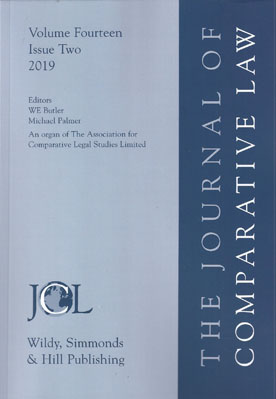Additional articles from SSRN have been noted by our friend in the Irish Society of Comparative Law:
 Dodson, Scott, Presuit Discovery in a Comparative Context (2012). Journal
of Comparative Law, Vol. 6, 2012.
Dodson, Scott, Presuit Discovery in a Comparative Context (2012). Journal
of Comparative Law, Vol. 6, 2012.
In civil litigation around the globe, the usual process is
that investigative discovery is allowed (if at all) only after the plaintiff
files an initial pleading. Recently, however, a growing number of jurisdictions
have adopted general mechanisms for presuit investigative discovery. This paper
explores these mechanisms and probes their nature and importance. It first
finds that presuit investigative discovery is surprisingly prevalent among
common-law systems, despite the usual order of pleading and discovery. The
paper then argues that presuit investigative discovery can provide a useful
tool for enabling plaintiffs to file a sufficient complaint in fact-pleading
jurisdictions. Finally, the paper suggests that the US federal system, as its
pleading system moves closer to the fact-pleading regime typical of the rest of
the world, ought to look to foreign mechanisms of presuit investigative
discovery as a model for its own reform.
Engle, Karen, Comparative Constitutional Law and Property: Responses to
Alviar and Azuela (2011). Texas Law Review, Vol. 89, No. 7, 2011.
I am pleased to have the opportunity to comment on two very
rich and provocative articles: Property in the Post-post-revolution: Notes on
the Crisis of the Constitutional Idea of Property in Contemporary Mexico by
Antonio Azuela and The Unending Quest for Land: The Tale of Broken
Constitutional Promises by Helena Alviar García. Both articles offer
historical and contemporary accounts of the role of the social function of
property in the constitutional framework of the countries they study (Mexico
for Azuela and Colombia for Alviar).
I begin this Commentary with a few general thoughts on
comparative method, and then engage in a comparison of the articles by
discussing three issues they raise. In particular, I consider the tension
between individual property rights and social function examined in each
article, the possibilities the authors imagine for collective rights and
conservation within the property rights regimes they examine, and the views
about the role of law the articles express.
Smith, Stephen A., Comparative Legal Scholarship as Ordinary Legal Scholarship
(October 10, 2012).
This essay argues that comparative law is not and never will
be a distinctive academic discipline. Various counter-arguments based on the
alleged distinctiveness of comparative law’s (1) subject-matter, (2)
methodology, (3) challenges, and (4) aims are identified and rejected. The
essay concludes by arguing that comparative scholars should embrace the
ordinariness of their scholarship. To the extent that comparative law is
associated with a particular subject-matter, method, challenge, or aim its
value will always be a matter for debate. By contrast, if comparative
scholarship is just ordinary scholarship with more data (as I argue), its value
is undeniable.

No comments:
Post a Comment